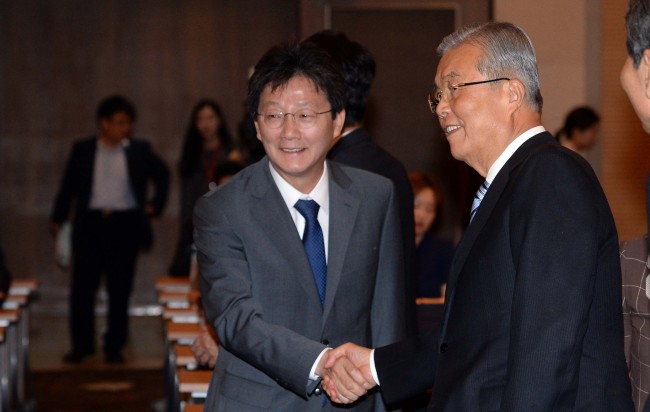Moderate lawmakers of rival parties launched a policy discussion group to advance reform agenda Tuesday, fueling speculation that the centrist gathering would transform into a new political force in the run-up to next year’s presidential election.
Named “Agenda 2050,” the panpartisan entity consists of 12 lawmakers including prominent centrists such as Rep. Kim Chong-in, the chairman of the main opposition The Minjoo Party of Korea, and Rep. Yoo Seong-min, an independent who had until earlier this year served as the ruling Saenuri Party’s floor leader.
 |
The Minjoo Party of Korea’s chairman Rep. Kim Chong-in (right) greets former Saenuri Party floor leader Rep. Yoo Seong-min at a meeting in Seoul on Tuesday. An hoon/ Korea Herald. |
Borrowing its name from the famous social reform plan led by the German government in 2003, the group would work on developing initiatives targeting overhauls in education, employment, welfare, taxation and administration. The group intends to work with the Korea Advanced Institute of Science and Technology. Other members include chief policymaker for the People’s Party, Rep. Kim Song-sik.
“It is a panpartisan study group to discuss strategies for Korea’s future policies,” said Rep. Kim Se-yeon, a third-term Saenuri lawmaker who led efforts to form the group. “We have recruited people who can share our views regardless of their (place on the) political spectrum.”
The third-term lawmaker said they would focus on developing welfare policy tailored to specific demographics, reinforcing the safety net for the unemployed and narrowing income gaps between the wealthy and the underprivileged, among other goals.
The centrist lawmaker stressed there is “no political purpose” in forming the group.
But speculation has grown nonetheless about the political implications of the move, mainly due to its high-profile list of members, many of whom have been thrust into the political limelight after clashing with President Park Geun-hye over difference in policies.
For instance, Minjoo Party leader Kim had been one of the chief strategists for Park, who was then presidential candidate of the Saenuri Party. But the former economics professor quit his job in 2012 as Park refused to endorse his signature policy of “economic democratization.” He later joined the main opposition party in 2015.
The same goes for former Saenuri floor leader Yoo. The fourth-term lawmaker began his political career by working as a chief of staff for then-lawmaker Park, but the relationship turned sour as the former economics professor openly denounced the president’s welfare policy and her dealings with the legislative body.
Rep. Kim Se-yeon is also considered close to Yoo. He was one of few Saenuri members who suggested that Yoo should be able to return to the party. Yoo left the party before the April general election in protest of the party’s decision to drop his nomination. He then went on to win his seat as an independent.
“We are going to hold an opening event and begin our job within this month,” said Kim. “In the meantime, we want to focus on coming up with specific policies and an agenda. We are not planning to add more members just to promote ourselves,” he said.
By Yeo Jun-suk (
jasonyeo@heraldcorp.com)








